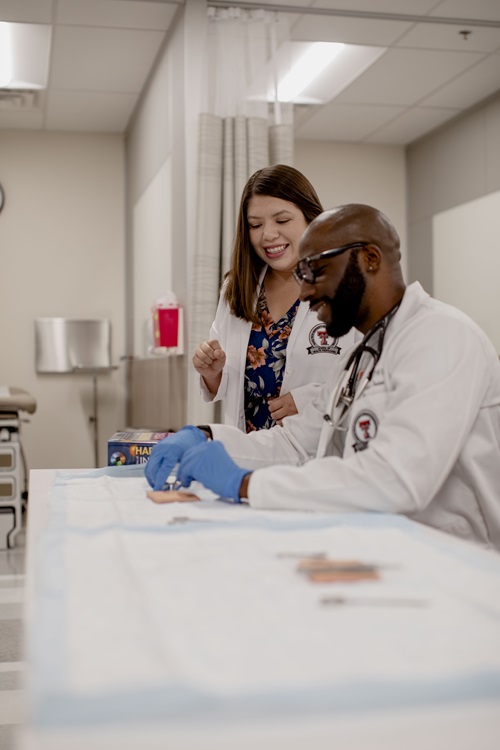Filling the Gap: PA Impact on Rural Health Care

TTUHSC strives to provide health care to medically underserved regions across West Texas
According to the AAPA Salary Report, almost one in 8 PAs (Physician Associate) work in non-metro or completely rural areas, and over half currently use telehealth or telemedicine in their clinical practice.
The same report states from their 2022 AAPA Student Survey that approximately 54 percent of new graduates were interested in working in a rural area. So, why is the interest in rural health care on the rise for PA students?
We spoke with Assistant Professor and Director of Clinical Education Elesea Villegas, MPAS, PA-C to learn more about the challenges rural health care currently faces and how PAs are stepping up to better serve the rural patient population.
The Challenges in Rural Health Care
According to a recent article published by STAT, more than 15% of Americans — about 46 million — live in rural areas, but only 10% of doctors practice in these communities, many of whom are primary care and family physicians.
Villegas grew up in a rural town, so she has seen firsthand the difficulties that these areas can face. She shares that rural health faces several challenges including limited access to care, provider shortages, and recruiting and retaining health care.
“We are seeing a lot of physician shortages in rural areas, and PAs play a crucial role in addressing some of these health care gaps,” says Villegas. “PAs can help fill that with coverage, increasing patient access to care and improving health care outcomes in those communities.”
What is TTUHSC Doing to Help?
For years, TTUHSC has focused on serving the medically underserved in areas across West Texas. The PA program currently has a HRSA grant that’s focused on this topic.
“We have 11 students that are engaged in the project with us,” Villegas explains. “They’re doing longitudinal rural rotations and rural community services.” She says that this project seeks to get students engaged with the community beyond the clinic and to provide extra support in telemedicine - all in hopes that more students will choose to work in a rural area after graduation.
The Future of Rural Health Care
Overall, Villegas sees rural health care improving, especially with an increasing number of PAs seeking to serve in these areas.
“Programs like ours that encourage and support students learning in rural health and promoting their work specifically in rural health in the future will only help to improve some of those gaps,” says Villegas.
![]()
Related Stories
TTUHSC Receives $1 Million Gift from Amarillo National Bank to Expand and Enhance Pediatric Care in the Panhandle
TTUHSC School of Medicine leaders accepted a $1 million philanthropic gift from Amarillo National Bank on Tuesday (Feb. 10), marking a transformational investment in pediatric care for the Texas Panhandle.
Texas Tech University Health Sciences Center Permian Basin Announces Pediatric Residency Program Gift
TTUHSC Permian Basin, along with the Permian Strategic Partnership and the Scharbauer Foundation, Feb. 5 announced a gift that will fund a new pediatric residency.
The Ph.D. Programs that Shape Health Care
The Graduate School of Biomedical Sciences Ph.D. programs at TTUHSC provide the foundation, mentorship and research opportunities you need to pursue groundbreaking work.
Recent Stories
National Academy of Inventors Names TTUHSC Faculty Senior Members
The National Academy of Inventors (NAI) has designated two current and one former TTUHSC faculty researchers as Senior Members.
The John Wayne Cancer Foundation Surgical Oncology Fellowship Program at Texas Tech University Health Sciences Center Announced
TTUHSC is collaborating with the John Wayne Cancer Foundation and has established the Big Cure Endowment, which supports the university’s efforts to reduce cancer incidence and increase survivability of people in rural and underserved areas.
TTUHSC Receives $1 Million Gift from Amarillo National Bank to Expand and Enhance Pediatric Care in the Panhandle
TTUHSC School of Medicine leaders accepted a $1 million philanthropic gift from Amarillo National Bank on Tuesday (Feb. 10), marking a transformational investment in pediatric care for the Texas Panhandle.
